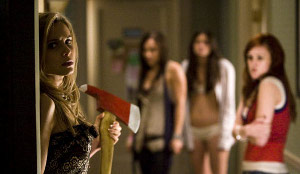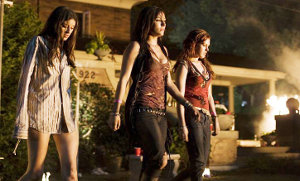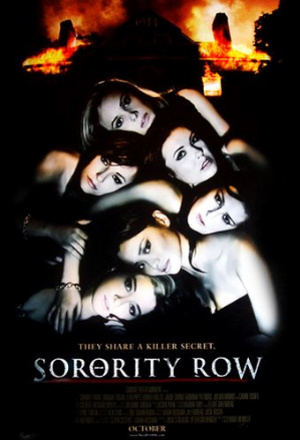
Josh Stolberg is the co-writer of the upcoming slasher flick Sorority Row (along with collaborator Pete Goldfinger). With the likes of Piranha 3D set to make him hot property, Retro Slashers catches up with Josh to discuss the making of one of 2009’s most anticipated slashers…
Having previously co-written the likes of Kids in America and Good Luck Chuck, how did you become involved in Sorority Row and did you have an interest in the horror genre as you were growing up?
“Most kids my age grew up with posters of Star Wars or Indiana Jones on their wall. I was the psycho kid with Freddy and Jason and Michael. Sure, I had the Luke and Indy (and let’s not forget Jennifer Beals in her Flashdance sweatshirt), but I fell in love with horror movies at a very young age. Halloween was a seminal movie for me – it scared the crap out of me but I couldn’t take my eyes off the screen. As far as Sorority Row in particular, it was actually my third horror script (the first was a script called Slashers, and the second was Piranha 3D, which comes out next year). One of the producers of Good Luck Chuck, a guy named Mike Karz, got the rights to House on Sorority Row and, being a fan of the original, I asked him to hold it for Pete Goldfinger and me to write.”
You mentioned an early piece called Slashers, can you elaborate on that?
“Slashers is my very first horror script. I had started thinking about the early days of horror and how, when the studios started to lose steam with The Mummy and Dracula, they started putting the monsters together – like Frankenstein meets the Wolf Man. I wrote it long before Freddy vs. Jason, and it was about three archetypal killers on an island with a single’s resort where they hack their way through the crowds, but wind up attacking each other, too. I remember even mocking up a poster for it that had the tag line: “3 serial killers. 300 singles. Not everyone is going home lucky.” It had been optioned a couple of times but never made. I’ll wind up doing a rewrite on it one of these days. It’s probably a good directing project for me.”
 Was it a challenge to pay homage to the original script whilst also making this your own and how would you describe your collaboration with Peter Goldfinger?
Was it a challenge to pay homage to the original script whilst also making this your own and how would you describe your collaboration with Peter Goldfinger?
“I had seen The House on Sorority Row when I was a kid. And I definitely remembered it. The clown was freaky. As far as updating, I’m of the mind that there’s no reason to remake a movie if you’re simply going to copy what is already there. The House on Sorority Row exists, you can go to the video store and rent it, there’s no reason to remake it frame by frame. Doing a remake for me is an opportunity to discover new stuff that wasn’t mined in the original. Or to take a left-turn with the original concept.
I love Mark’s movie. It’s a ton of fun. And to hear stories about how it got made, with no money and no stars, is incredible. And it’s even more incredible that it stands out as a cut above the typical slasher movie of that era. Pete and I knew going in that although it was important to pay homage to the spirit of the original, this would have to become our own movie. Times have changed, audience expectations have changed, sororities have changed. It had to be re-imagined.
As far as my working relationship with Pete, collaborating with him is a lot of fun. It never feels like work. Partly because he’s one of my best friends, but also because he’s really talented and very giving, creatively. We tend to break stories together, and then go off and write alone, passing pages back and forth, rewriting each other until we feel like there’s nothing either of us wants to change.”
As you were developing both the story and the screenplay were you conscious of avoiding slasher clichés or did you find it was more fun to play up to many of the audience’s expectations?
“A little of both. You’ve got to give the audience what they want – and some of what they are craving IS the clichés. I mean, do we have a girl in jeopardy? Yes, a few. Do we have a killer who dispatches victims in creative ways? Yes, definitely. But what’s a slasher movie without those kinds of clichés? For me, the most important ingredient of a good slasher movie is FUN – more than blood and guts (which we have an ample helping of), more than sex (which we also have a bunch of). I go to see horror movies for the same reason I ride roller coasters. To look death in the eye and be able to walk away with my life. There are definitely some tongue-in-cheek aspects to Sorority Row, and we’ve tried to walk the line of truly scary while also having some fun with the characters and the dialogue.”
 The story seems to share as many similarities with I Know What You Did Last Summer as it does with The House on Sorority Row, how much of an influence did they both play and were there any other films which were a major influence on your writing?
The story seems to share as many similarities with I Know What You Did Last Summer as it does with The House on Sorority Row, how much of an influence did they both play and were there any other films which were a major influence on your writing?
“There are definitely some similarities. That’s because both Sorority Row AND I Know What You Did Last Summer drew their inspiration from Mark Rosman’s The House on Sorority Row. Even though IKWYDLS was based on a book, it’s got some pretty significant aspects to it that are not in the book, but are in Rosman’s original film. I’m not saying IKWYDLS was ripping HOSR off, not at all, but it definitely lives in the same world. In the same way that Friday the 13th lives in the same world of Halloween. As far as inspirational films, there are too many to mention. Scream was definitely an influence. Tonally. Although we aren’t as self-aware as that movie, our Sorority Row is a bit of a throw-back to those kinds of films. It’s a mystery, for one. And we focus a little more on characters and dialogue than most of the straight-up torture horror movies of late.”
Were there many guidelines which you were given by the studio when you were first given the assignment and how much freedom were you allowed to develop the script as you both felt fit?
“No guidelines. Total freedom. We wrote the script that we wanted to. We had a pretty clear vision of what we were going for. After finishing a few drafts on our own, there were, of course, a bunch of rewrites for the producers, the studio, and the director. But I honestly think they all helped the script. And it was nice to be the first, last and only writers on the movie. It doesn’t happen too often.”
One major plot difference between Sorority Row and The House on Sorority Row is that the prank this time around is not played on the house mother but instead on a cheating boyfriend. Were there any earlier drafts which were closer to the original story or was it decided from the beginning that you would take the concept in a new direction?
“We knew from the outset we were going to take it in a new direction. For a few reasons. First, we didn’t want any fans of the original to feel like they were watching the same movie a second time. Second, we thought it was a little sexier to focus more on the girls this time around. And third, we had had been sitting on this idea for the opening of the movie, basically the first fifteen minutes of our Sorority Row, for about eight years. We had come up with the idea while pitching a rewrite of a 2001 movie called Valentine (we didn’t get the job, but the idea stuck with us). When Pete and I started batting around ideas for our Sorority Row, we stumbled upon this scene and everything kind of fell into place because of it.”
With the protagonists being a selection of attractive teenage girls, how challenging was it for you to write them in convincing ways without resorting to typical ‘chick flick’ stereotypes?
“That’s a tough question. Obviously, I’m not an attractive teenage girl (none of those words would be used to describe me). But I’m not one of those people that think you have to BE the thing you’re writing about. One of my favorite movies about teen girls was written by a guy (Daniel Waters, Heathers). I mean, most writers and directors have to go outside of themselves to find material that excites them. Ang Lee has made some of the best movies about the American experience (movies like The Ice Storm and Brokeback Mountain), yet he still kicks ass with films like Crouching Tiger. I also find that it’s not necessarily about capturing the EXACT voice of the people you’re writing for, but more about finding their spirit. I remember when Dawson’s Creek first came out, I was talking to all these teenagers who were amazed that the voices of the kids on the show were “just like them.” Kevin Williamson had “captured their voices perfectly,” which was complete garbage. Those kids in Dawson’s Creek were MUCH smarter than the kids I was talking to, who used “like” and “totally” in every other sentence. But what Williamson was able to do was capture their essence. Anyway, in Sorority Row, it’s a little tongue-in-cheek in the way the characters speak. It’s not stylized, but it is definitely heightened reality. And it’s anything but “chick flick”.
 Did you always intend for the script to be graphic in its portrayal of violence or were you ever considering aiming for the PG-13 market, particularly as The House on Sorority Row was not an explicit film?
Did you always intend for the script to be graphic in its portrayal of violence or were you ever considering aiming for the PG-13 market, particularly as The House on Sorority Row was not an explicit film?
“There was definitely talk about making this PG-13 initially. From the studio. Our first draft was a hard R. We had always intended to make an R-rated movie. I don’t pretend to think you CAN’T make a good PG-13 horror movie (for instance, I really enjoyed Drag Me To Hell, and Jaws was PG and that was pretty terrifying). But I like my horror with a dose of blood and guts, and it’s hard to pull that off AND keep the MPAA happy. We actually did a pass for the studio to tone down the violence and strip the script of language and sex, etc., but to the studio’s credit, everyone realized that it just didn’t feel right. In the end we all thought the R version would allow us a lot more latitude in terms of scares, as well as humor.”
How would you compare this new generation of slasher remakes to the ones released in the early eighties and, with the likes of Halloween, My Bloody Valentine and Friday the 13th being ‘re-imagined,’ what does Sorority Row offer which similar films do not?
“Personally, I’m a HUGE horror fan, so I’ll take my slasher movies where I can get them. It’s great to see new concepts and horror arenas break out, but it’s getting harder and harder to get a studio to invest in a new idea. It’s much safer for them if there is underlying material. This is a business and it’s small-minded to just damn writers and film-makers for not being more creative – it’s the system. Just look at Drag Me To Hell. Great movie. Lots of fun. Original. But from a financial stand-point, it failed. You could argue it’s because horror fans didn’t want to see a PG-13 movie. But that didn’t stop people from flocking to Prom Night last year. For me, if the new “re-imagined” movies are done well, I’m excited to see them. I’m hoping that Sorority Row will give the audience a little more than they expect. It has the scares, but also some laughs. In the test screenings, people really fell in love with some of the characters, which is always a good sign for horror because you want the audience to care for the victims before you hack them limb from limb. It’s the same reason, as a farmer, you’re not supposed to name your pigs. It’s a lot harder to eat the bacon if you named it first.”
 One important aspect of the slasher film is the killer, who should sport a recognizable and distinct visage. Was there much debate as to how he/she should look and how did you come up with the idea for the tire iron with various weapons attached?
One important aspect of the slasher film is the killer, who should sport a recognizable and distinct visage. Was there much debate as to how he/she should look and how did you come up with the idea for the tire iron with various weapons attached?
“Coming up with the killer’s look was one of the most difficult things we had to tackle. Partly, because, as you suggest, it needs to have an iconic feel to it. But also, specifically for our movie, it had to hide the identity of the killer so that you don’t know if it’s a guy, a girl, or maybe someone who had come back from the dead. We spent a LOT of time spit-balling and brain-storming and it was actually Pete’s brother, Ed Goldfinger, who turned us on to the idea that it could be someone in a graduation gown. Which was one of those “duh” moments for us, because it was so obvious after we heard it that that was clearly the answer. The movie takes place at graduation, so of course that’s what it should be. For a while, we were calling the killer the “Cap and Gown” killer because it wore a cap instead of a hood, but when we started preproduction, we realized that it would be impossible to shoot some of the chase scenes and kill scenes with only the cap to block the killer’s face. So we had to switch it up. As for the weapon, it was something that grew out of the first kill — after Megan gets stabbed with the tire iron. We wanted something cooler and scarier than just a plain tire iron and we started brainstorming with Stewart and the props department and that’s what we all came up with. In the original script, the first draft, it was just described as a “tricked-out tire-iron.” But the final look was definitely a team effort.”
How supportive have websites and horror fans been of the project and do you find that a remake automatically carries a certain amount of stigma which causes some to immediately dismiss the film without even giving it a chance?
“We’ve actually caught the most hell for similarities to I Know What You Did Last Summer, from people who probably didn’t know that ours is based on a movie that came out BEFORE that one did. But the truth is, you can’t please everyone. You just hope to please the people that are actually going to give it a chance. I can’t stop some kid from sitting in his underwear in his bedroom, bagging on our movie online, having never even seen it. The trailer, as much as I love it (and I really do love it), also doesn’t totally capture the “fun” element of our movie. I think it hits the sorority sister stuff, and the scary stuff, but there’s an entertaining aspect that doesn’t thoroughly come through.
It’s funny to me that there’s such a stigma on remakes. Sure, sometimes they feel a little pointless (like I totally didn’t understand the shot-by-shot Psycho remake) and sometimes they are done piss-poorly (I don’t want to name any names). But they can be amazing. West Side Story is a remake of Romeo and Juliet. Same story. But different characters. Different set-pieces. Different dialogue. And totally unique unto itself. Scorsese’s Cape Fear? Should that film be considered insignificant because it’s a remake? I don’t think so. Some remakes are obvious improvements, like John Carpenter’s The Thing. But there are a ton of other GREAT movies that we wouldn’t have if someone didn’t say, “I want to remake this.” Like The Bourne Identity, which was a remake of a television show. Or last year’s 3:10 to Yuma, which I loved. House of Wax (NO, NOT THE RECENT REMAKE), but the earlier Vincent Price one was a remake of an old silent film. I thought Alex Aja’s Hills reboot was an improvement on the original. The Fly is a cheap one to throw out, but it doesn’t make it less true. I LOVED the new Dawn of the Dead… when that zombie started sprinting after the car at the beginning… awesome. Scarface. Hell, I LOVED The Departed. And that’s two Martin Scorsese movies… I want to talk to the person who tells me that Scorsese is a hack. Look, the truth is that any film has the potential to suck – it’s rarely because it’s a remake that makes it bad.”
 With the central concept of Sorority Row being a group of teenage girls being murdered one-by-one, do you think these types of films are irresponsible, particularly in an age when Columbine-style massacres seem commonplace. The slasher genre has always been given a hard time from various film critics such as Siskel & Ebert. Should watching the senseless murder of teenagers be considered harmless entertainment?
With the central concept of Sorority Row being a group of teenage girls being murdered one-by-one, do you think these types of films are irresponsible, particularly in an age when Columbine-style massacres seem commonplace. The slasher genre has always been given a hard time from various film critics such as Siskel & Ebert. Should watching the senseless murder of teenagers be considered harmless entertainment?
“I’ve always hated that argument. It becomes even more ridiculous when you see the people making it – like Bill O’Reilly a couple of years ago saying that horror movies threaten the fabric of society. These gory movies have been around for a LONG time. And before that, there were gory plays (Titus Andronicus, anyone?). Does watching Die Hard make people want to become domestic terrorists? Does watching Sopranos make people want to start a life of organized crime? Horror movies are escapist thrill-rides – they are a way to get your girlfriend to snuggle up closer to you. Plus, built into most of these movies are slightly over-the-top costumed killers with outlandish weapons. On top of this, especially in the movies that I love, the audience is siding with the victims. In Sorority Row, you are rooting for the girls (well, the girls you like). By telling the story from the heroine’s perspective, we turn the audience against this killer, and therefore his behavior. Even in Silence of the Lambs, where you enjoy Lecter’s character, you’re still not hoping he lashes out and kills Jodie Foster. I don’t know… I don’t think that criticism really holds too much weight.”
How involved were you in the actual production of the movie and were you consulted during shooting? Does the final cut differ much from your script?
“We were very involved. From start to finish. At the end of the day, Sorority Row is Stewart’s movie. He was a great director and really got his vision up on the screen – but he was also very good about staying faithful to what we all originally talked about from the start. And he really used us as sounding boards throughout the entire process. We had input on everything from casting to the ADR. We were on the set two weeks early to sit in on rehearsals to help make the script better – hell, when the girls were not available, it was Pete and me who read the missing girls’ parts. It was an amazing collaboration and I’m really grateful to both Stewart and the studio for keeping us so involved throughout. In regards to your other question, the final cut of the film IS our final draft. Sure, there are a couple of changes in the order of scenes, and there are some cuts to time, but the film is how we all imagined it.”
 If Sorority Row proves to be a hit would you be willing to participate in a sequel? With you also working on the script for the Piranha remake, do you find horror an interesting genre to write and do you have any more projects planned for the foreseeable future?
If Sorority Row proves to be a hit would you be willing to participate in a sequel? With you also working on the script for the Piranha remake, do you find horror an interesting genre to write and do you have any more projects planned for the foreseeable future?
“We’ll obviously have to wait to see what happens, but I really had a great time working on the movie. If a sequel is being talked about, I’m sure Pete and I will be in on the conversation. As far the horror genre in general, I’ve been bitten by the bug and I’ll definitely be working on more of them. Pete and I have a list of a half-a-dozen or so horror ideas that we’re tossing around. We hope to get busy on a new one soon.”
Stay updated with Josh Stolberg at joshstolberg.com

3 Responses to Exclusive Interview with Sorority Row (2009) Writer Josh Stolberg